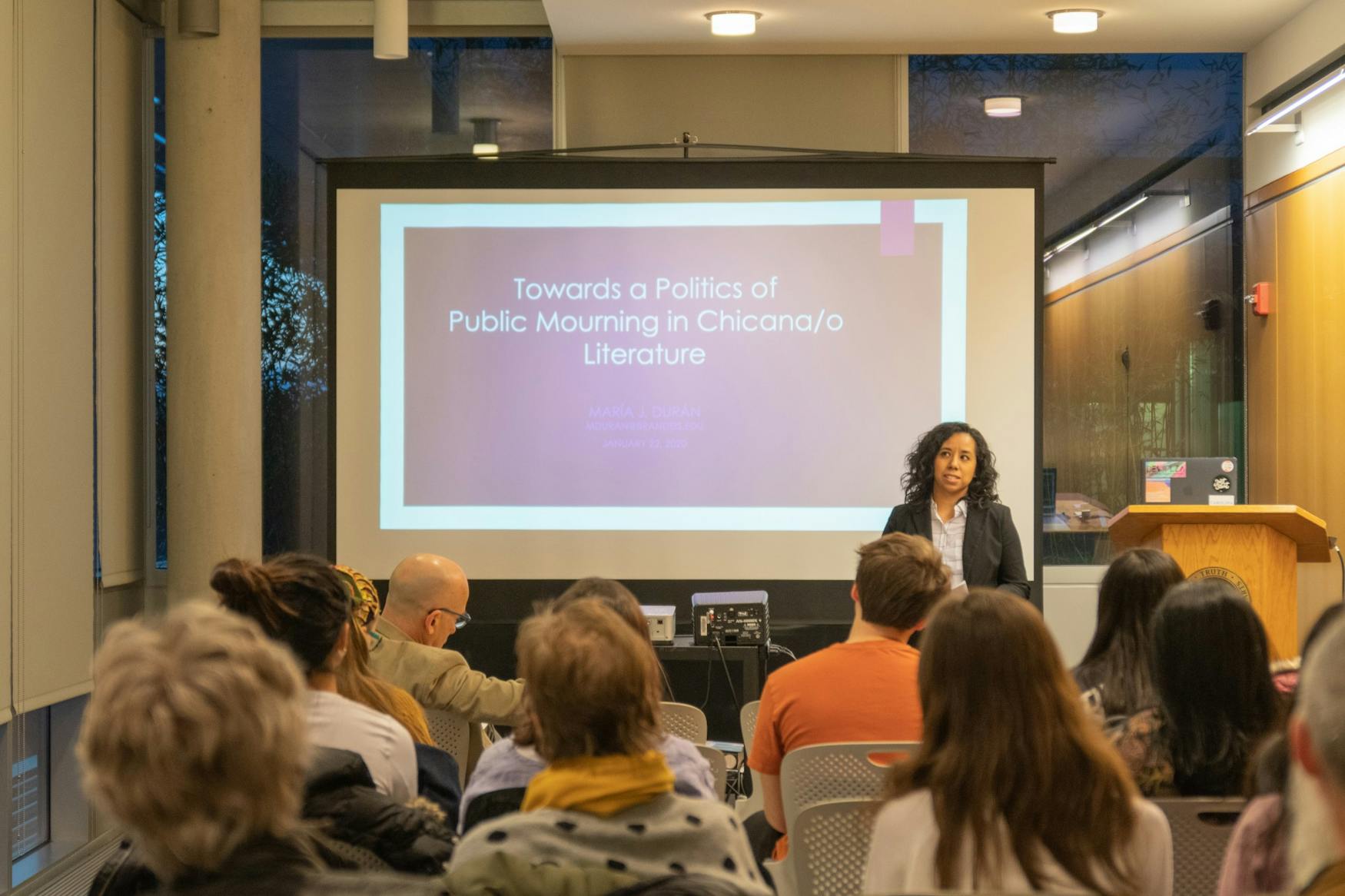Scholar speaks about Chicana/o plays on political dissent
María Durán discussed depictions of grief in Mexican literature and their political implications.
María Durán, a Florence Levy Kay Fellow in U.S. Latinx Cultural Studies, delivered a presentation on Wednesday discussing her research project on Mexican-American literature, otherwise known as Chicana/o literature. Durán said that through her research, she aims to explore “alternative narratives to grief,” meaning looking at how grief is perceived through non-Western cultures.
Durán’s lecture, titled “Towards a Politics of Public Mourning in Chicana/o Literature,” discussed “treating mourning as something that is relevant to politics, noting that it does have political implications, it has political effects and that it is also a way of linking mourning to political engagement and activity.”
Durán described grief as being “one of the most powerful human emotions.” In North America, she said, “grief is often understood as a disease,” emphasizing that she saw this both as a “disease” and a “dis-ease.” By this, Durán meant that the concept of grief has been pathologized here, and prolonged mourning is not viewed in a positive manner. She added that psychology has changed how modern society perceives grief, explaining that pathologizing it and viewing it as an ailment makes grief “a debilitating and emotional response to loss that people have to work through efficiently.” This is “an erasure of how we used to think about grief as a holistic, necessary, human, relational experience,” Durán said.
Durán explained her research questions as exploring the “unlimited, emotional potential” of grief. Her questions, as included in her slideshow, are “What do responses to loss look like when not inhibited or pathologized?”; “Which discourses or theoretical frameworks illuminate grief and mourning?”; “Why do expressions of grief in literature matter?”; and “What kind of work can mourning carry out?”
She said her manuscript, titled “Living Resistance: the Politics of Mourning in Chicana and Chicano Literature,” explores these questions as they pertain to Chicana/o literature, specifically as presented by late-20th and 21st century Chicana/o playwrights. Durán furthered that these plays show how “[Chicana/o and Mexican] acts of mourning are political and affective responses to loss that actively move beyond the realm of victimhood,” noting that acts of public mourning allow the dead to remain “alive and politically relevant” and treat grief as “something normal.”
Durán then discussed a play titled “Braided Sorrow” by Marisela Treviño Orta, which deals with femicide and other violence against women in Ciudad Juárez, Mexico. She explained that studies conducted in 2010 reported more than 500 murders of women and girls and more than 1,000 other disappearances in this region of Mexico since 1993, with these numbers still increasing. She said that many people have written fictional plays and texts about the recurring violence, suggesting that there is a link between fictional portrayals and a lack of action from the Mexican government as the victims can be actively mourned through these narratives.
“Braided Sorrow” follows a girl named Alma whose family moves to Ciudad Juárez for work. Alma begins working in a “maquiladora,” or assembly plant, through which the play reveals the exploitation of and violence against the women working there. Later, when Alma is attacked, she is saved by La Llorona –– a figure in Latin American fables –– through whom, Durán explained, this play addresses the topic of grief and public mourning.
La Llorona is “a surrogate mother whose haunting presence grieves deaths caused by femicide and whose maternal resistance manifests in the form of public mourning,” Durán said. “She’s defending the grievability of the women of Juárez and simultaneously critiques how Mexican state authorities have excluded these women from the political to justify the state’s criminal impunity,” she added. Durán said that because the fable of La Llorona has “indigenous Mexican roots,” the figure is therefore “grieving the anticipated loss of peoples, cultures and place.”
“I read La Llorona as a figure who employs grief for political ends. She mobilizes her grief as a form of resistance and a critical response to loss in Ciudad Juárez, and raises questions about gender violence, citizenship, criminal impunity, neoliberal practices and globalization,” Durán said.
Interpreting “Braided Sorrow” further, Durán explained the aesthetics of the play and, in a close reading of a few of La Llorona’s lines, showed how La Llorona felt grief mentally and physically after losing her daughter. “You would not be having this very visceral reaction, emotional reaction, if someone were not grievable,” Durán stated.
Quoting Judith Butler, Durán said that “the social vulnerability of our bodies” is what connects us and makes one grievable. “Loss is a human universal,” she read from a Butler quote. Therefore, “the loss of those whose lives were not recognized through a lens of shared vulnerability –– those whose lives are not deemed grievable –– they can’t be mourned because they are always already lost,” Durán added, further quoting Butler.
Durán said that the repeated violence against women in Ciudad Juárez and the criminal impunity implies a “meaninglessness of these womens’ lives.”
“I contend that public mourning demonstrated through ‘Braided Sorrow’ can help us do the necessary work of politicizing the disappearances and murders of Mexicanas,” Durán said. She called on the audience to pay attention to authors’ portrayals of public mourning in literature –– “They’re defending the grievability of marginalized communities [and] they’re restoring human dignity so we remember they are human.”
According to Prof. Fernando Rosenberg (HISP, COML), Durán received an English doctoral degree from the University of North Carolina and wrote her dissertation on “Chicana Perspectives on the Political Ends of Grief and Public Mourning.” Her field of study, Rosenberg added, includes Latinx theater and performance, literary fiction and “engaging also with political questions around non-hegemonous feminist thought and cultural agency toward social change.”



Please note All comments are eligible for publication in The Justice.